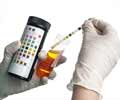Researchers have stated that patients with type II diabetes could have a reduced evidence of benefit if they self monitor their blood glucose level.
According to researchers at the University of Western Australia, Fremantle, for the patients with type II diabetes, the control of blood sugar does not seem to be improve if they self-monitor their blood glucose levels.
Dr. Wendy A. Davis and colleagues, who published their study in the journal Diabetes Care, explained that they conducted their study by examining data from 1,286 patients who were enrolled in the Fremantle Diabetes Study. It was reported that a total of 531 subjects had completed their annual reviews over five years.The researchers explained that around 70% of the patients had reported performing self-monitoring of blood glucose when entering the study, with an average of four tests per week. It is widely accepted that the general lines of blood glucose monitoring includes shorter diabetes duration; attending diabetes education sessions or diabetes-related clinics; seeing medical specialists; taking insulin with or without glucose-lowering oral drugs; and self-reporting episodes of low blood sugar.
The researchers explained that their findings had not shown any significant differences in blood glucose levels or in frequency of testing between those who self-monitored blood glucose and those who did not. They further mentioned that this finding was also true on the whole and within diabetes treatment groups.
According to the guidelines that are recommended by the current American Diabetes Association are, self-monitoring of blood glucose should be performed three or more times per day for type II diabetic patients who are under multiple insulin injections, and that for patients using once-daily insulin, oral (glucose-lowering) agents, or diet alone, there is low-level evidence of benefit.
Davis and colleagues noted in their study that, “Our data," they conclude, "add to the evidence relating to diet- and (glucose-lowering drug)-treated patients, but we did not sub-divide our insulin-treated patients by injection frequency because of relatively low numbers.” They further suggested that blood glucose monitoring might still be useful for type II diabetic patients who require insulin, so as to help in adjusting their dose and thereby preventing an attack of hypoglycaemia or low blood sugar.
 MEDINDIA
MEDINDIA
 Email
Email










